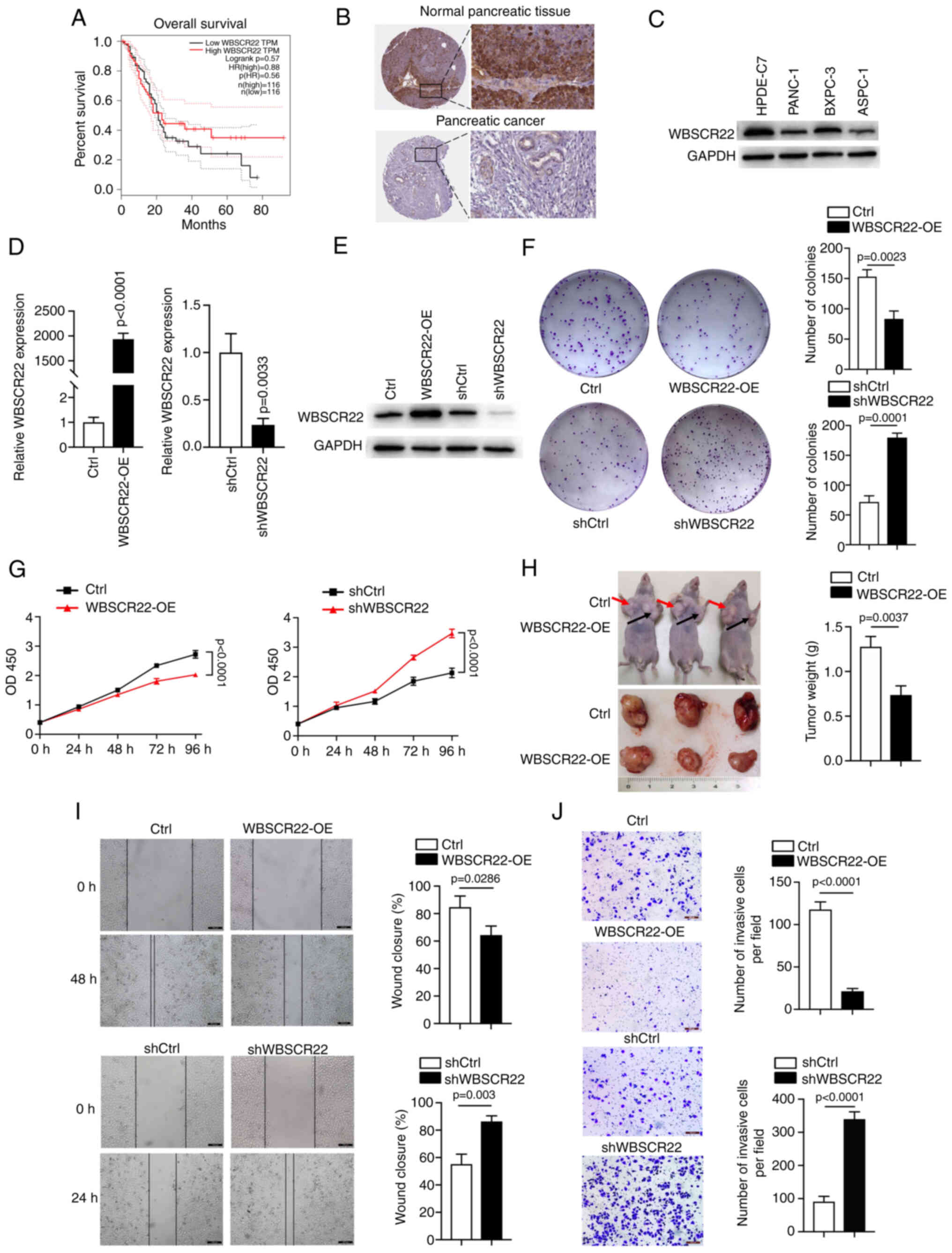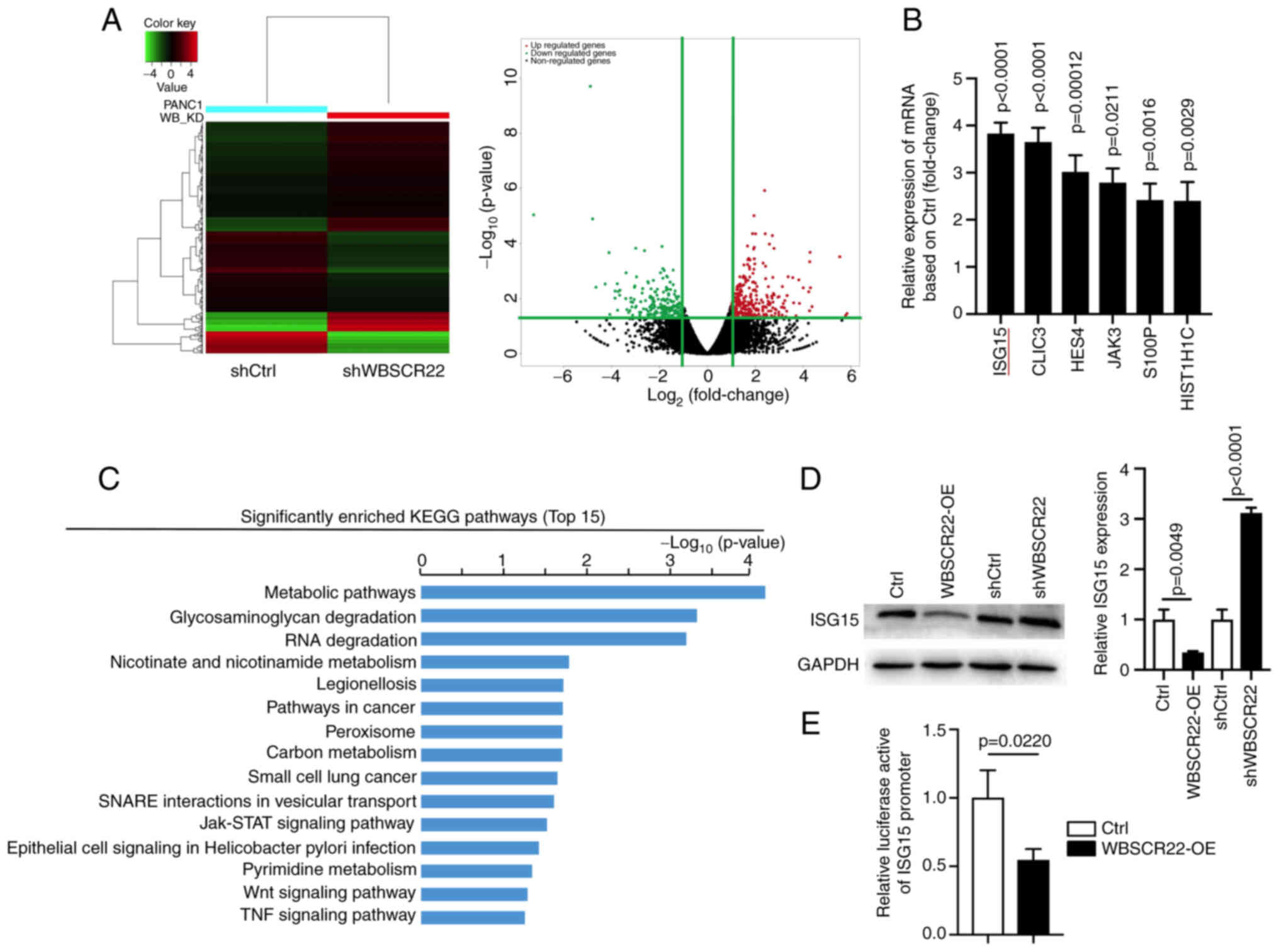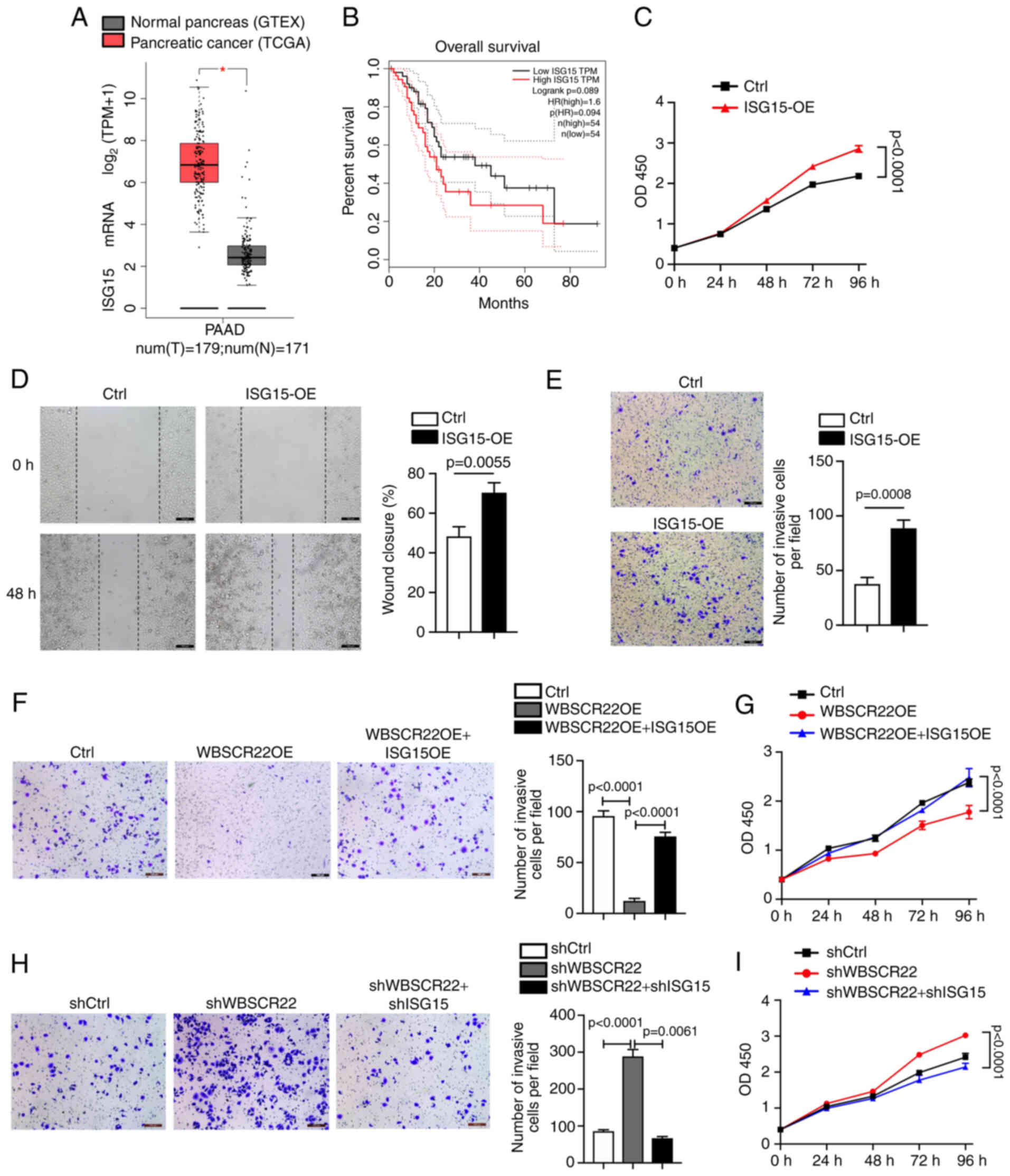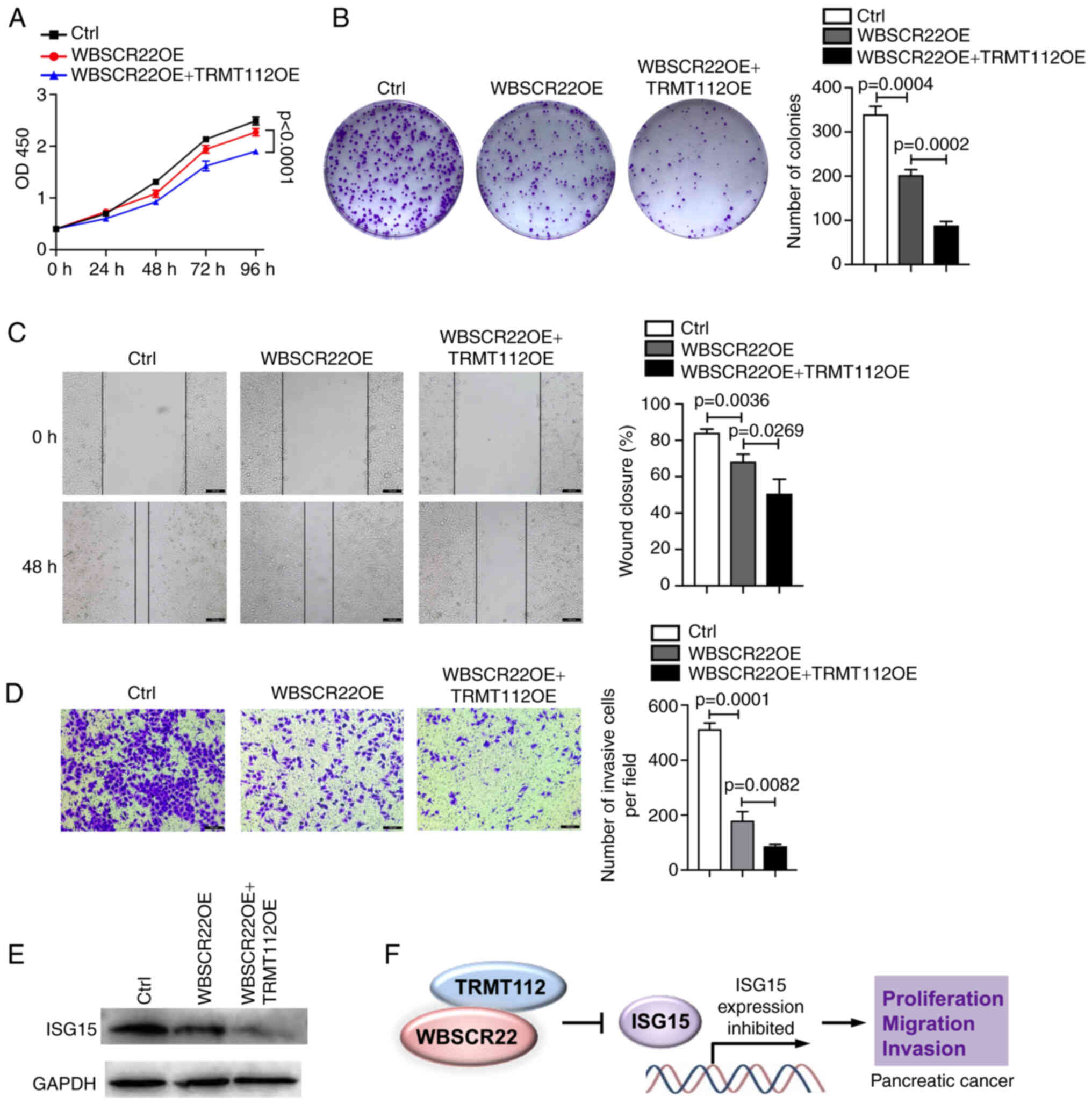|
1
|
Khan AA, Liu X, Yan X, Tahir M, Ali S and
Huang H: An overview of genetic mutations and epigenetic signatures
in the course of pancreatic cancer progression. Cancer Metastasis
Rev. 40:245–272. 2021. View Article : Google Scholar : PubMed/NCBI
|
|
2
|
Cao W, Chen HD, Yu YW, Li N and Chen WQ:
Changing profiles of cancer burden worldwide and in China: A
secondary analysis of the global cancer statistics 2020. Chin Med J
(Engl). 134:783–791. 2021. View Article : Google Scholar
|
|
3
|
Aier I, Semwal R, Sharma A and Varadwaj
PK: A systematic assessment of statistics, risk factors, and
underlying features involved in pancreatic cancer. Cancer
Epidemiol. 58:104–110. 2019. View Article : Google Scholar
|
|
4
|
Hung YH, Hsu MC, Chen LT, Hung WC and Pan
MR: Alteration of epigenetic modifiers in pancreatic cancer and its
clinical implication. J Clin Med. 8:9032019. View Article : Google Scholar :
|
|
5
|
Ferrari M and Stagi S: Oxidative stress in
down and Williams-Beuren syndromes: An overview. Molecules.
26:31392021. View Article : Google Scholar : PubMed/NCBI
|
|
6
|
Pangallo E, Cianci P, Favuzza F, Milani D,
Vimercati C, Moretti A, Picchi R, De Paoli A, Agosti M and
Selicorni A: Pulmonary function in Williams-Beuren syndrome:
Spirometric data of 22 Italian patients. Am J Med Genet A.
185:390–396. 2021. View Article : Google Scholar
|
|
7
|
Wang LX, Leng J, Li ZH, Yan L, Gou P, Tang
F, Su N, Gong CZ and Cheng XR: Clinical and genetic characteristics
of two cases with Williams-Beuren syndrome. Transl Pediatr.
10:1743–1747. 2021. View Article : Google Scholar : PubMed/NCBI
|
|
8
|
Merla G, Ucla C, Guipponi M and Reymond A:
Identification of additional transcripts in the Williams-Beuren
syndrome critical region. Hum Genet. 110:429–438. 2002. View Article : Google Scholar : PubMed/NCBI
|
|
9
|
Alesi V, Loddo S, Orlando V, Genovese S,
Di Tommaso S, Liambo MT, Pompili D, Ferretti D, Calacci C, Catino
G, et al: Atypical 7q11.23 deletions excluding ELN gene result in
Williams-Beuren syndrome craniofacial features and neurocognitive
profile. Am J Med Genet A. 185:242–249. 2021. View Article : Google Scholar
|
|
10
|
Zorbas C, Nicolas E, Wacheul L, Huvelle E,
Heurgue-Hamard V and Lafontaine DL: The human 18S rRNA base
methyltransferases DIMT1L and WBSCR22-TRMT112 but not rRNA
modification are required for ribosome biogenesis. Mol Biol Cell.
26:2080–2095. 2015. View Article : Google Scholar : PubMed/NCBI
|
|
11
|
Õunap K, Käsper L, Kurg A and Kurg R: The
human WBSCR22 protein is involved in the biogenesis of the 40S
ribosomal subunits in mammalian cells. PLoS One. 8:e756862013.
View Article : Google Scholar : PubMed/NCBI
|
|
12
|
Garcia BCB, Horie M, Kojima S, Makino A
and Tomonaga K: BUD23-TRMT112 interacts with the L protein of Borna
disease virus and mediates the chromosomal tethering of viral
ribonucleoproteins. Microbiol Immunol. 65:492–504. 2021. View Article : Google Scholar : PubMed/NCBI
|
|
13
|
Nakazawa Y, Arai H and Fujita N: The novel
metastasis promoter Merm1/Wbscr22 enhances tumor cell survival in
the vasculature by suppressing Zac1/p53-dependent apoptosis. Cancer
Res. 71:1146–1155. 2011. View Article : Google Scholar
|
|
14
|
Tiedemann RE, Zhu YX, Schmidt J, Shi CX,
Sereduk C, Yin H, Mousses S and Stewart AK: Identification of
molecular vulnerabilities in human multiple myeloma cells by RNA
interference lethality screening of the druggable genome. Cancer
Res. 72:757–768. 2012. View Article : Google Scholar
|
|
15
|
Yan D, Tu L, Yuan H, Fang J, Cheng L,
Zheng X and Wang X: WBSCR22 confers oxaliplatin resistance in human
colorectal cancer. Sci Rep. 7:154432017. View Article : Google Scholar : PubMed/NCBI
|
|
16
|
Jangani M, Poolman TM, Matthews L, Yang N,
Farrow SN, Berry A, Hanley N, Williamson AJ, Whetton AD, Donn R and
Ray DW: The methyltransferase WBSCR22/Merm1 enhances glucocorticoid
receptor function and is regulated in lung inflammation and cancer.
J Biol Chem. 289:8931–8946. 2014. View Article : Google Scholar : PubMed/NCBI
|
|
17
|
Stefanska B, Cheishvili D, Suderman M,
Arakelian A, Huang J, Hallett M, Han ZG, Al-Mahtab M, Akbar SM,
Khan WA, et al: Genome-wide study of hypomethylated and induced
genes in patients with liver cancer unravels novel anticancer
targets. Clin Cancer Res. 20:3118–3132. 2014. View Article : Google Scholar : PubMed/NCBI
|
|
18
|
Chi YJ, Liang Z, Guo YW, Chen D, Lu L, Lin
J, Qiu S, Wang X, Qiu E, Lin F, et al: WBSCR22 confers cell
survival and predicts poor prognosis in glioma. Brain Res Bull.
161:1–12. 2020. View Article : Google Scholar : PubMed/NCBI
|
|
19
|
Reich N, Evans B, Levy D, Fahey D, Knight
E Jr and Darnell JE Jr: Interferon-induced transcription of a gene
encoding a 15-kDa protein depends on an upstream enhancer element.
Proc Natl Acad Sci USA. 84:6394–6398. 1987. View Article : Google Scholar : PubMed/NCBI
|
|
20
|
Chen RH, Xiao ZW, Yan XQ, Han P, Liang FY,
Wang JY, Yu ST, Zhang TZ, Chen SQ, Zhong Q and Huang XM: Tumor
cell-secreted ISG15 promotes tumor cell migration and immune
suppression by inducing the macrophage M2-like phenotype. Front
Immunol. 11:5947752020. View Article : Google Scholar
|
|
21
|
Freitas BT, Scholte FEM, Bergeron É and
Pegan SD: How ISG15 combats viral infection. Virus Res.
286:1980362020. View Article : Google Scholar : PubMed/NCBI
|
|
22
|
Loeb KR and Haas AL: The
interferon-inducible 15-kDa ubiquitin homolog conjugates to
intracellular proteins. J Biol Chem. 267:7806–7813. 1992.
View Article : Google Scholar : PubMed/NCBI
|
|
23
|
Alcalá S, Sancho P, Martinelli P, Navarro
D, Pedrero C, Martín-Hijano L, Valle S, Earl J, Rodríguez-Serrano
M, Ruiz-Cañas L, et al: ISG15 and ISGylation is required for
pancreatic cancer stem cell mitophagy and metabolic plasticity. Nat
Commun. 11:26822020. View Article : Google Scholar : PubMed/NCBI
|
|
24
|
Yuan WM and Krug RM: Influenza B virus NS1
protein inhibits conjugation of the interferon (IFN)-induced
ubiquitin-like ISG15 protein. EMBO J. 20:362–371. 2001. View Article : Google Scholar : PubMed/NCBI
|
|
25
|
Villarroya-Beltri C, Guerra S and
Sánchez-Madrid F: ISGylation-a key to lock the cell gates for
preventing the spread of threats. J Cell Sci. 130:2961–2969.
2017.PubMed/NCBI
|
|
26
|
Dang F, Nie L and Wei W: Ubiquitin
signaling in cell cycle control and tumorigenesis. Cell Death
Differ. 28:427–438. 2021. View Article : Google Scholar :
|
|
27
|
Zhang D and Zhang DE:
Interferon-stimulated gene 15 and the protein ISGylation system. J
Interferon Cytokine Res. 31:119–130. 2011. View Article : Google Scholar :
|
|
28
|
Liu MJ, Li XL and Hassel BA: Proteasomes
modulate conjugation to the ubiquitin-like protein, ISG15. J Biol
Chem. 278:1594–1602. 2003. View Article : Google Scholar
|
|
29
|
Bogunovic D, Boisson-Dupuis S and Casanova
JL: ISG15: Leading a double life as a secreted molecule. Exp Mol
Med. 45:e182013. View Article : Google Scholar : PubMed/NCBI
|
|
30
|
D'Cunha J, Knight E Jr, Haas AL, Truitt RL
and Borden EC: Immunoregulatory properties of ISG15, an
interferon-induced cytokine. Proc Natl Acad Sci USA. 93:211–215.
1996. View Article : Google Scholar : PubMed/NCBI
|
|
31
|
Held T, Basler M, Knobeloch KP and
Groettrup M: Evidence for an involvement of the ubiquitin-like
modifier ISG15 in MHC class I antigen presentation. Eur J Immunol.
51:138–150. 2021. View Article : Google Scholar
|
|
32
|
Desai SD, Haas AL, Wood LM, Tsai YC,
Pestka S, Rubin EH, Saleem A, Nur-E-Kamal A and Liu LF: Elevated
expression of ISG15 in tumor cells interferes with the
ubiquitin/26S proteasome pathway. Cancer Res. 66:921–928. 2006.
View Article : Google Scholar : PubMed/NCBI
|
|
33
|
Li C, Wang J, Zhang H, Zhu M, Chen F, Hu
Y, Liu H and Zhu H: Interferon-stimulated gene 15 (ISG15) is a
trigger for tumorigenesis and metastasis of hepatocellular
carcinoma. Oncotarget. 5:8429–8441. 2014. View Article : Google Scholar : PubMed/NCBI
|
|
34
|
Burks J, Reed RE and Desai SD: ISGylation
governs the oncogenic function of Ki-Ras in breast cancer.
Oncogene. 33:794–803. 2014. View Article : Google Scholar
|
|
35
|
Burks J, Fleury A, Livingston S and Smith
JP: ISG15 pathway knockdown reverses pancreatic cancer cell
transformation and decreases murine pancreatic tumor growth via
downregulation of PDL-1 expression. Cancer Immunol Immunother.
68:2029–2039. 2019. View Article : Google Scholar : PubMed/NCBI
|
|
36
|
Wan XX, Chen HC, Khan MA, Xu AH, Yang FL,
Zhang YY and Zhang DZ: ISG15 inhibits IFN-α-resistant liver cancer
cell growth. Biomed Res Int. 2013:5709092013. View Article : Google Scholar
|
|
37
|
Zhou MJ, Chen FZ, Chen HC, Wan XX, Zhou X,
Fang Q and Zhang DZ: ISG15 inhibits cancer cell growth and promotes
apoptosis. Int J Mol Med. 39:446–452. 2017. View Article : Google Scholar
|
|
38
|
Jeon YJ, Jo MG, Yoo HM, Hong SH, Park JM,
Ka SH, Oh KH, Seol JH, Jung YK and Chung CH: Chemosensitivity is
controlled by p63 modification with ubiquitin-like protein ISG15. J
Clin Invest. 122:2622–2636. 2012. View Article : Google Scholar : PubMed/NCBI
|
|
39
|
Burks J, Reed RE and Desai SD: Free ISG15
triggers an antitumor immune response against breast cancer: A new
perspective. Oncotarget. 6:7221–7231. 2015. View Article : Google Scholar : PubMed/NCBI
|
|
40
|
Liger D, Mora L, Lazar N, Figaro S, Henri
J, Scrima N, Buckingham RH, van Tilbeurgh H, Heurgué-Hamard V and
Graille M: Mechanism of activation of methyltransferases involved
in translation by the Trm112 'hub' protein. Nucleic Acids Res.
39:6249–6259. 2011. View Article : Google Scholar : PubMed/NCBI
|
|
41
|
Gu T, He H, Zhang Y, Han Z, Hou G, Zeng T,
Liu Q and Wu Q: Trmt112 gene expression in mouse embryonic
development. Acta Histochem Cytochem. 45:113–119. 2012. View Article : Google Scholar : PubMed/NCBI
|
|
42
|
Figaro S, Wacheul L, Schillewaert S,
Graille M, Huvelle E, Mongeard R, Zorbas C, Lafontaine DL and
Heurgué-Hamard V: Trm112 is required for Bud23-mediated methylation
of the 18S rRNA at position G1575. Mol Cell Biol. 32:2254–2267.
2012. View Article : Google Scholar : PubMed/NCBI
|
|
43
|
Sardana R and Johnson AW: The
methyltransferase adaptor protein Trm112 is involved in biogenesis
of both ribosomal subunits. Mol Biol Cell. 23:4313–4322. 2012.
View Article : Google Scholar : PubMed/NCBI
|
|
44
|
Leetsi L, Õunap K, Abroi A and Kurg R: The
common partner of several methyltransferases TRMT112 regulates the
expression of N6AMT1 isoforms in mammalian cells. Biomolecules.
9:4222019. View Article : Google Scholar :
|
|
45
|
Õunap K, Leetsi L, Matsoo M and Kurg R:
The stability of ribosome biogenesis factor WBSCR22 is regulated by
interaction with TRMT112 via ubiquitin-proteasome pathway. PLoS
One. 10:e01338412015. View Article : Google Scholar : PubMed/NCBI
|
|
46
|
Livak KJ and Schmittgen TD: Analysis of
relative gene expression data using real-time quantitative PCR and
the 2(-Delta Delta C(T)) method. Methods. 25:402–408. 2001.
View Article : Google Scholar
|
|
47
|
Teoh ST and Lunt SY: Metabolism in cancer
metastasis: Bioenergetics, biosynthesis, and beyond: Metabolism in
cancer metastasis. Wires Syst Biol Med. 10:e14062018. View Article : Google Scholar
|
|
48
|
Bergers G and Fendt SM: The metabolism of
cancer cells during metastasis. Nat Rev Cancer. 21:162–180. 2021.
View Article : Google Scholar : PubMed/NCBI
|
|
49
|
Zhang YF, Thery F, Wu NC, Luhmann EK,
Dussurget O, Foecke M, Bredow C, Jiménez-Fernández D, Leandro K,
Beling A, et al: The in vivo ISGylome links ISG15 to metabolic
pathways and autophagy upon Listeria monocytogenes infection. Nat
Commun. 10:53832019. View Article : Google Scholar : PubMed/NCBI
|
|
50
|
Sun J, Yan J, Qiao HY, Zhao FY, Li C,
Jiang JY, Liu BQ, Meng XN and Wang HQ: Loss of TRIM29 suppresses
cancer stem cell-like characteristics of PDACs via accelerating
ISG15 degradation. Oncogene. 39:546–559. 2020. View Article : Google Scholar
|


















